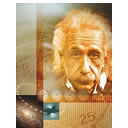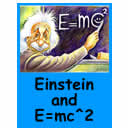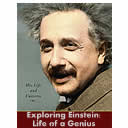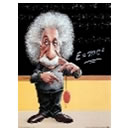Einstein's Unfinished Symphony
 As Albert Einstein lay on his deathbed, he asked only for his glasses, his writing implements and his latest equations. He knew he was dying, yet he continued his work. In those final hours of his life, while fading in and out of consciousness, he was working on what he hoped would be his greatest work of all. It was a project of monumental complexity. It was a project that he hoped would unlock the mind of God.
As Albert Einstein lay on his deathbed, he asked only for his glasses, his writing implements and his latest equations. He knew he was dying, yet he continued his work. In those final hours of his life, while fading in and out of consciousness, he was working on what he hoped would be his greatest work of all. It was a project of monumental complexity. It was a project that he hoped would unlock the mind of God.
"I am not interested in this phenomenon or that phenomenon," Einstein had said earlier in his life. "I want to know God’s thoughts – the rest are mere details." But as he lay there dying in Princeton Hospital he must have understood that these were secrets that God was clearly keen to hang on to. The greatest scientist of his age died knowing that he had become isolated from the scientific community; revered on the one hand, ridiculed for this quest on the other.
It was a journey that started 50 years earlier in Berne, Switzerland. Then – in his early 20s – he was a young man struggling to make his mark. His applications to universities throughout Europe had all been rejected. In the end his father had pulled strings to get him a job as a third class clerk evaluating the latest electrical gizmos. But in his spare time he was formulating the most extraordinary scientific ideas. In a single year – 1905, a year that would become known as his miracle year – he published papers that would redefine how we see our world and universe.
He confirmed that all matter was composed of molecules – an idea that at the time was controversial. And most famously of all, he published the paper 'On the electrodynamics of moving bodies'. It contained his Theory of Special Relativity and suggested that time – something that had always thought to be unchanging and absolute – was relative. It could speed up or slow down depending on the speed you were travelling. From this paper would come an additional three pages, finished in September of the same year, that would contain the derivation of e=mc², the most famous mathematical equation ever written.
Einstein was on a roll. Ten years after his Theory of Special Relativity, he published his Theory of General Relativity – a piece of work widely acknowledged as his masterpiece. The great 17th century scientist Sir Isaac Newton had described the force of gravity very successfully, but what caused gravity remained a mystery. In this Theory of General Relativity, Einstein suggested that gravity was due to the bending of time and space by massive objects. In 1919 astronomers confirmed this by measuring the bending of starlight around the sun during a solar eclipse.




We exist within a 4 dimensional environment known as Space-Time. We are constantly on the move within it. However, we are always confined to the present time. That is the inside. The outside is all the remaining time of the 4D Space-Time environment, meaning all of it other than that ongoing " present time ".
Did you know that if you look at the truth, you see the truth. Thus if you look at the truth concerning the basic structure of reality, you see the basic structure of reality. No great brain is required to do this. Thus any Joe Blow who looks in the direction of truths, can discover Special Relativity(SR) and all of its equations, and do so all by ones self.
Einstein also preferred to look at truths.
My YouTube videos make it clear just how easy it is to discover SR all on your own.
Einstein didn't even have YouTube! Can you imagine..
I studied physics & topped the class in grade 11 & 12 at Bumayong Secondary School in Papua New Guinea some years ago .. I tell U there isn't a scientist I admire more than Albert Einstein .. We both seem to have the same thinking that there is a 'spiritual' side to the origin of the Universe, simply stating that 'God created the Universe & all its wonders', He gave mankind the limits to their Knowledge !
Einstein chose to stay in touch with reality, while other physicists chose to accept the inexplicable world of quantum mechanics, and to venture no further. Thus they chose not to reach for the theory of everything, but to simply remain at being at a distance from it. In turn, they had chosen to accept the idea that there were mere quantum probabilities of an event occurring, and that is all, meaning that there are absolutely no specific direct causes behind it all. They had chosen the insane act of defining this incompleteness, as completeness. This is an act of total insanity. To fully accept something as a form of completeness without completely understanding it, is sheer madness.
An apple has both an inside and an outside. So does reality. Each side holds a unique set of laws of physics. Today's physicists accept only the laws of physics that are present on the inside, thus if an event is governed from the outside and its laws, it has the physicists totally baffled. At best, they call it an outcome of the "mysteriousness" of Quantum mechanics and go no further.
What do you mean reality has an inside and an outside?
People should check out Richard Feynman interviews. The man that polished off Dirac's mess. Charming man and brilliant insightful - able to explain the most complex things in simple analogies for the rest of us. And he solved the tragic Challenger puzzle. How cool was that?
Gravity and information can 'travel' FTL. Our alien friends have clearly mastered gravity, but we are too immature and violent to be in possession of it anyway perhaps.
He had the mind necessary to unravel the laws of gravity at a Quantum level ... if only he'd accepted QM...... tragic waste. Wonderful accomplishments, but he dropped the ball right when he was so close.
He may have failed, but he still was quite the badass. Although a science of probability is beautiful as well, I think we shouldn't underestimate the power to understand.
When one actually examines the life of Albert Einstein, one finds that his only brilliance lies in his ability to plagiarize and steal other people's ideas, passing them off as his own. This documentary just furthers the Einstein deception and lies.
Einstein's education, or the lack thereof, is an important part of this story. The Encyclopedia Britannica says Einstein's early education that he 'Showed little scholastic ability" It also says that at the age of 15, "with poor grades in history, geography, and languages, he left school with no diploma." Einstein himself wrote in a school paper of his " lack of imagination and practical ability." In 1895, Einstein failed a simple entrance exam to an engineering school in Zurich, Switzerland. This exam consisted mainly of mathematical problems, and Einstein showed himself to be mathematically inept in this exam.
Unable to go to the school that he had wanted he got a job at the patent office in Bern, Switzerland. He was to be a technical expert third class, which meant that he was too incompetent for a higher qualified position. Even after publishing his so called groundbreaking papers of 1905 and after working in the patent office for six years, he was only elevated to second class standing. Remember, the work he was doing at the patent office, for which he was only rated third class, was not quantum mechanics or theoretical physics, but was reviewing technical documents for patents of everyday things, yet he was barely qualified.
The idea that the speed of light was constant and was independent of the motion of it's source was far from being originally Einstein's. The ideal was first proposed by Scottish scientist James Maxwell. Maxwell studied the phenomenon of light extensively and first propose that it was electromagnetic in nature. He wrote an article to this effect for the 1878 edition of the Encyclopedia Britannica.
His ideas prompted much debate, and by 1887, as a result of his work and the ensuing debate, the scientific community particularly Lorentz, Michelson, and Morley reached the conclusion that the velocity of light was independent of the velocity of the observer. Thus, this piece of the Special Theory of Relativity was known 27 years before Einstein wrote (plagiarized) his paper.
Wow, and did you know that newton knew that gravity existed before Einstein? Must make General Relativity plagiarism too. And it was already known that matter contained some sort of energy so E=MC squared...also plagiarized. Yeah I can see where you're going with this. There's a term for a method of knowing wherein nothing can be accepted unless it was ordained all at once by all knowing super beings...religion. Science...is...cumulative. All theories are derived from earlier ones so why don't you actually try to publish something before you go slamming on those who had the analytical talent that you manifestly lack.
Ps. I have attempted to publish work for which I was unaware a precedent had already been established. It has been shot down every time. If Special Relativity was already understood at the time of Einstein's publication, peer review would have caught it.
and concerning the General relativity , E=mc^2 , photoelectric effect, and his contributions in studies of Kinetics of Gases in Cryogenics theoretically etc.. > Did he plagiarize all of that ?!
Utter bulls*it. You haven't examined his life at all.
any body knows that themesong in the beginning when he enters the hospital?!!
A great documentary that gives good insight into one of the sharpest minds of the 20th century. An excellent introduction for those who would like to learn more about what makes genius. (quit looking for answers, and start asking the right questions!)
Anyone know the name of the song the boy is rockin on the violin at around 19:50?
J. S. Bach - Violin Concerto No. 1 in A-minor.
You're welcome. :)
Ah yes! Many thanks. I should have known it was Bach, considering his double violin concerto in D minor is probably my all time favorite piece of music.
u seem to be an expert so Could I ask u what is the opera themesong in the begining of the movie when Albert enters the hospital :D ?!!
I know I've heard this melody, but I just can't place it... I never was much of a fan of opera, except for Mozart's, and even there I'm not an expert.
Sorry 'bout that. :(
Never mind man :), Thanks for caring attention any way :)
Albert Einstein was not an atheist..........
I do not believe in a personal God and I have never denied this but have expressed it clearly. If something is in me which can be called religious then it is the unbounded admiration for the structure of the world so far as our science can reveal it. (Albert Einstein, 1954)
Why would Einstein believe in your gods, if he didn't even believe in "spooky actions at a distance?"
@ Josh Perez. Someone else who actually knows some history regarding Einstein. How refreshing!
the mind of god!!!
Einstein had beliefs similar to Spinoza. He felt that an "anthropomorphic diety" was a niave and childish concept. However did not disregard the possibility of a higher power. He was not an athiest.
@Bj Watson. Finally, someone who understands that Einstein was a Deist. How refreshing to see someone who knows what they are talking about, without predjudice. Good job!
I haven't watched the doc yet, but the description disturbs me concerning its claims that Einstein was religious. Before anyone writes a description they should actually have knowledge about the person they're writing about.
Here are some Einstein quotes regarding his beliefs:
"It seems to me that the idea of a personal God is an anthropological concept which I cannot take seriously."
"It was, of course, a lie what you read about my religious convictions, a lie which is being systematically repeated. I do not believe in a personal God and I have never denied this but have expressed it clearly. If something is in me which can be called religious then it is the unbounded admiration for the structure of the world so far as our science can reveal it."-3/24/1957
EINSTEIN WAS NOT RELIGIOUS!!!!!
Sorry for the yelling, but it displeases me when people take Einstein out of context and redefine who he actually was.
Vlatko will you please rewrite this video's description because its misleading at best, and merely perpetuates a false meme thats been floating around.
P.S. Vlatko I love the site, and appreciate everything... I've literally spend hundreds of hours on this site. By creating this website, you've changed my life for the better, and I thank you!
I don't believe he wasted the last years of his life at all.
@Lee Nelson:
I did not enter your post because your two links you presented are not viable, do not work, I can enter your post without the links if you so wish. Or you may try another posting.
Video not working :(
what a extraordinary person einstein is..
i personally think he will be proven right about his quest for theory of everything.. soon someone will prove it with the help of supercomputer or AI.
It would be great if someone brilliant picked up Einstein's approach in the future and showed it to be right after all. However, the doc is skewed in not even mentioning such a possibility and instead entirely submitting to the prevalent QM view: Einstein was "ultimately" wrong and out-of-touch, while QM people were right and on the right track.
The world of science is not so black and white. The documentary doesn't really elaborate why Einstein despised QM. It implies that he has done so because of stubborness (arrogance?) and some shallow metaphysical ideas. Yet it is more plausible that he revolted against QM's quasi-religious take on reality and against the self-satisfied laziness of its proponents.
I think Einstein's main point was that we should never stop asking questions or seeking better deterministic models. This is what has advanced science over centuries. If we instead simply point a finger at statistics and make appeals to "inherent randomness", we have basically given up much too soon. Whenever macroscopic statistical models yield good predictions, the "random" or "statistics" part just represents our lack of information about the subject. What allows us to assume that it is extremely different in microscale? Aren't people who accept it akin to those who would, some time ago, ascribe "inherent randomness" to the experiment of throwing dice? And do these microscopic models always yield the best possible predictions? How will we find out if we declare them final instead of trying to look inside the box to identify new unknown factors?
There is a statement in the film along the lines that "newly discovered elementary particles behaved as unpredictably as they should". This, and Heisenberg's "it's impossible" attitude, nicely sums up the lazy-ass anti-science worldview at the core of the QM approach.
The fact that QM has turned out to be a more useful model for technical advances than Einstein's stalled "theory of everything", does not imply that his theory would not have been better still - if he managed to finish it. Those who dismiss it today may one day turn out to be the fools. It is not unusal in the history of science that right intuitions were given up for decades or even hundreds of years before being ultimately rediscovered. It is also not unusual in physics that multiple different models yield good predictions. Thinking along the lines "QM is the final answer because Einstein hasn't shown us otherwise, and he was the man, after all", as this documentary suggests, is naive.
Really fascinating. I agree with Travis, if you're pretty clued up on relativity etc, this won't have anything new - but if you're a beginner, ths is a great starting point.
One thing about this that I don't like, however, is their attempt to portray Einstein as religous - which he certainly wasn't. He saw "God" as the mystery of nature and the laws of physics (a pantheist, in other words). He made it clear that he did not believe in a personal, creator God - and considered such beliefs childish.
This programme seems to imply that he was a devout believer. Absolutely not.
For the record, the documentary states that Einstein believed in 'god', and says nothing about him being religious. To discern the difference, is to get closer to understanding what Einstein believed.
a decent basic introduction to einstein's life and the theories of relativity and quantum mechanics, but this doc will probably be pretty boring to anyone who knows even a little about these subjects. well-produced and mildly interesting, but definitely nothing more than pop science.